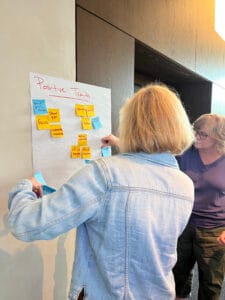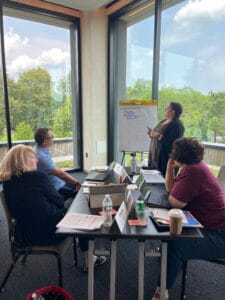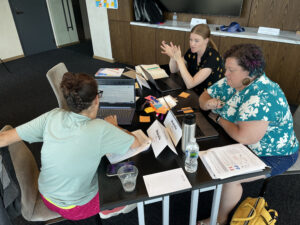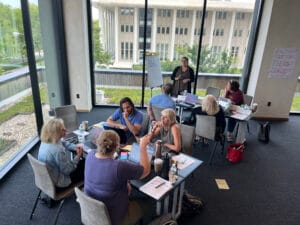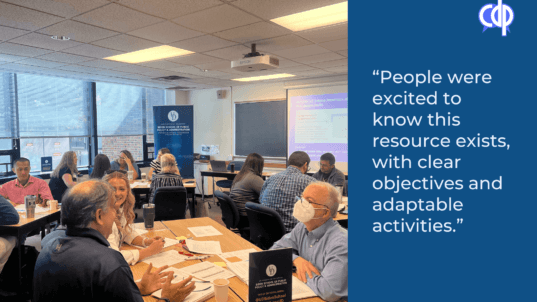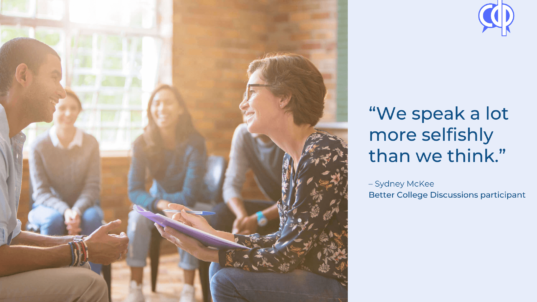From July 21-25, 2024, the University of Chicago’s Parrhesia Program for Public Discourse hosted its inaugural Parrhesia High School Educator Seminar on Freedom of Expression, Academic Inquiry, and Campus Discourse. Among the seminar’s highlights was a workshop introducing the Collaborative Discussion Toolkit produced by the Interactivity Foundation (IF). This workshop offered high school educators practical tools and adaptable methods to guide students in engaging constructively across differences.
Leila Brammer, Director of Outreach and Instructional Development for the Parrhesia Program, had previously undertaken a Collaborative Discussion workshop with IF President Shannon Wheatley Hartman. She describes herself as having had the Eureka moment of “This is it!”—by incorporating the Toolkit into the Parrhesia Seminar, she could support educators and, by extension, their students. “The key focus of the seminars is helping teachers, both inside and outside the classroom, build the conditions and develop the capacities for students to inclusively and productively engage about, with, and across differences and disagreements.”
Engaging in collaborative dialogue isn’t just about sharing ideas—it’s about entering and embracing gray areas, or ‘liminal spaces’. As Brammer put it, “Liminal spaces, the in-between places where we’re uncomfortable and uncertain, are where we learn and spark new imagination. When we’re in conversation with people who challenge our ideas, we’re forced to rethink or strengthen our positions. That’s where true growth happens.” Facilitating such spaces is vital in educational settings. It encourages students to grapple with new viewpoints and broaden their understanding, preparing them to navigate complex, diverse interactions both inside and outside the classroom.
Bremmer links this to academic inquiry, and suspects that the college applications of the future will benefit from including collaborative discussion skills. “I believe in the future that these types of skills—the capacities like students being able to seek and engage with difference and disagreement, and being able to prove that they can—will become part of a college application process. As [colleges] start thinking about well-rounded applicants, what they’ll really want are people who will come to their institutions and be [capable of] academic inquiry, free inquiry, the ability to seek and engage difference and disagreement, to sit with it, and move forward through it.”
“I’d always thought I’d build my own toolkit, but why would I when there’s already one available that’s accessible to everyone?”
The Collaborative Discussion Toolkit provided attendees with a structured, flexible resource for facilitating just such open inquiry and meaningful dialogue. “The Interactivity Foundation has, in my opinion, the best and most expansive set of tools for teachers,” shared Brammer. In addition to being adaptable, “the Collaborative Discussion Toolkit is well-organized, comprehensive, invitational, and gives credit—plus, it’s free, which is essential.”
“I encourage teachers to use the Collaborative Discussion Toolkit because it has all the elements you want in a resource, and it’s open to everyone.”
In the workshop, participants explored core Toolkit activities around topics such as managing group dynamics, navigating challenging conversations, and fostering inclusive communication. One of the most powerful aspects was the sense of community it fostered. Brammer observed that “They were a great group, really bonded, and shared ideas freely. There was so much trust in the room to talk about things that didn’t work, things that did work, and the challenges they were facing.” Through hands-on practice of collaborative discussion, attendees were able to engage deeply with the Toolkit’s practical applications, sparking new ideas and learning tips and techniques to bring back to their classrooms.
“Good faculty development helps educators see that they’re not alone in these challenges. When teachers see others who are facing similar issues but finding different ways to address them, that collective knowledge helps build a community.”
For many attendees, the workshop provided a range of takeaways that they planned to implement immediately in their classrooms. Reflecting on the experience, Brammer noted, “It’s amazing to have a resource we can put out there and reach the widest possible audience. When you remove barriers like cost and exclusivity, you can create something with real impact.” As IF continues to support educators and community leaders, the Collaborative Discussion Toolkit remains a vital tool for fostering inclusive, thoughtful dialogue.
Your Invitation to Collaborate
The Collaborative Discussion Toolkit is free and accessible to anyone interested in promoting more inclusive, thoughtful dialogue. If you’d like to introduce these skills in your own community or learn more about hosting a similar workshop, reach out to us or explore the toolkit.
👉 Start using the free Collaborative Discussion Toolkit
👉 Reach out for support running a session for your team or group
Learn more about Leila (LinkedIn, ResearchGate), the Parrhesia Seminar and Summer Academy.


